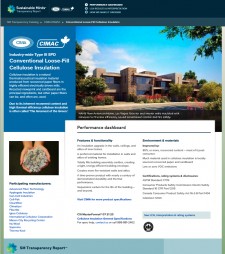Cellulose Insulation North American Environmental Product Declaration

DAYTON, Ohio, February 26, 2020 (Newswire.com) - The Cellulose Insulation Manufacturers Association and the Cellulose Insulation Manufacturers Association of Canada, trade associations for producers of cellulose thermal/acoustical insulation in North America, and Sustainable Minds, a leading provider of products and services to facilitate environmental product transparency, have collaborated to publish an industry-wide environmental product declaration (EPD) for cellulose insulation made by 13 manufacturers in the United States and Canada.
Joining in this international effort to simplify the process of identifying and specifying insulation that meets the highest standards of environmentally preferable and sustainable building materials are Advanced Fiber Technology, Bucyrus, Ohio; Applegate Insulation, Webberville, MI; Can-Cell Industries, Edmonton, AB; Service Partners Cell-Pak, Decatur, AL; CleanFiber LLC, Buffalo, NY; Climatizer Insulation, Etobicoke, ON; Fiberlite Technologies, Joplin, MO; Igloo Cellulose, Dorval, QC; International Cellulose Corporation, Houston, Texas; Mason City Recycling, Mason City, IA; Nu-Wool Company, Jenison, MI; Soprema, Drummondville, QC; and Thermo-Kool of Alaska, Wasilla, Alaska.
An EPD is an independently verified and registered document that quantifies environmental information on the life cycle of a product to enable comparisons between products fulfilling the same function. Cellulose insulation, which is produced in energy-efficient electrically-driven mills from recovered newsprint, cardboard, and other paper fiber materials, has long been recognized as one of the most environmentally sound building materials. The EPD provides independently verified data to aid buyers and specifiers in evaluating the environmental impacts of cellulose insulation.
“Due to its high recovered content, low embodied energy, and carbon sequestration capacity, environmentalists and sustainable building advocates have long regarded cellulose as a preferred insulation,” said Daniel Lea, executive director of CIMA and CIMAC. “Now, this EPD provides verified data for 10 different impact categories buyers and specifiers can use to assist in the selection of building thermal and acoustical insulation.
“This EPD, which is available free from Sustainable Minds, allows consumers and specifiers to make better-informed decisions about the environmental impacts associated with the building products they choose. It also helps CIMA and CIMAC members identify areas in which the environmental performance of their products can be improved,” Lea said. Find it at www.transparencycatalog.com/company/cima-cimac.
The Associations
Most manufacturers of cellulose insulation in the U.S. and Canada belong to CIMA or CIMAC. The associations sponsor research programs and work actively for continued development of the National Building Code of Canada and the codes published by the International Code Council. CIMA works to raise awareness of the potential for using the built environment for carbon sequestration through specification of materials that function as effective carbon sinks. www.cellulose.org
Sustainable Minds
Sustainable Minds' product transparency cloud solutions help manufacturers design and market greener products. They help building professionals find and specify greener, healthier products for high-performance buildings and reward manufacturers for making them. In 2013, the company introduced its award-winning SM Transparency Report, an innovation in EPD delivery, and became a program operator creating standardized tools that make product transparency easier and more effective.
Media Contact: Dan Lea, (888) 881-2462, cima@cellulose.org
Source: Cellulose Insulation Manufacturers Association